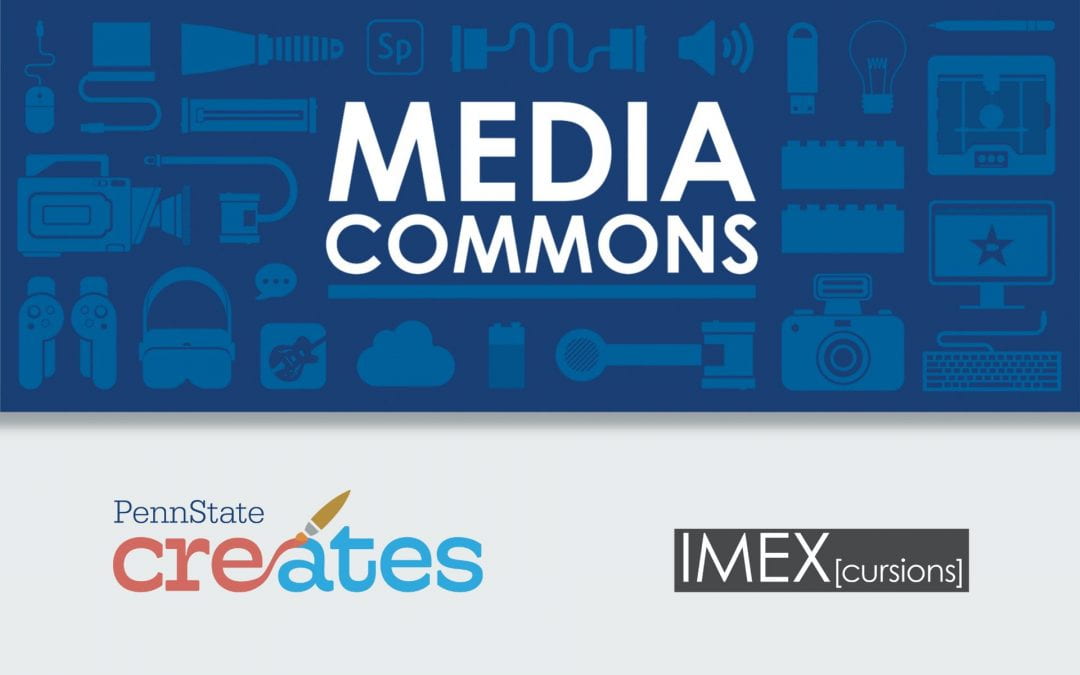
Apr 9, 2020 | Home Page
Media Commons, presented by Penn State’s Teaching and Learning with Technology (TLT), has unveiled two new initiatives designed to help the University community get creative and also explore while sheltering at home.
“While Penn Staters are practicing social distancing to stay safe and healthy, we realize that there is a need to spend time in enriching activities,” said Bart Pursel, interim director of innovation with TLT. “We’re excited about offering programs to the entire Penn State community that allow participants to learn something new and exercise their creativity in an informal environment.”
Penn State Creates debuts on Wednesday, April 15, at 3:00 p.m. with an Adobe Fresco Painting Party. This is the first in a weekly series of sessions that gives attendees the chance to explore new forms of expression through technology. The relaxed, informal programs require no previous experience with the software or technology.
At the inaugural Penn State Creates painting party, participants will use Adobe Fresco to create digital works of art. An iPad, or another compatible tablet, is needed to participate along with the free Adobe Creative Cloud account available to University students, faculty, and staff. The painting party will be hosted via Zoom, and anyone who does not have an Adobe Fresco-compatible tablet is welcome to join and watch as the art is created in real-time.
More information on upcoming Penn State Creates sessions can be found by bookmarking the webpage or by following TLT and Media Commons on Twitter. University students, faculty, staff, alumni, and the Penn State community throughout the Commonwealth are all invited to take part.
For those who want to explore far-off locales with the help of immersive technology, there is the IMEX[scursions] program. Immersive technology can include 360-degree video, virtual reality, and augmented reality; its use can allow for up-close, hands-on discovery of cultures’ landmarks, traditions, cuisines, and more.
The team at Penn State Media Commons’ Immersive Experience Lab (IMEX Lab) plans to add a new, worldly excursion to the catalog each week. Currently, it offers explorations of France, South Korea, and Egypt. Those who are interested in taking an IMEX[cursion] should review the equipment requirements to be fully prepared for their trip.
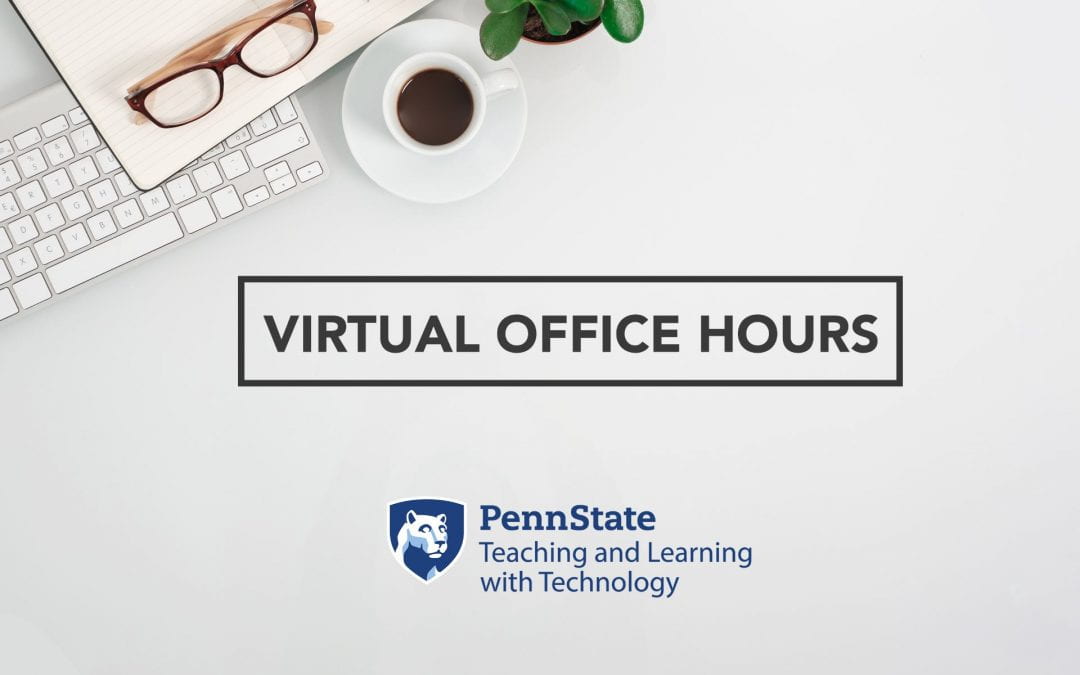
Mar 20, 2020 | Home Page
Teaching and Learning with Technology (TLT) will continue to support Penn State faculty’s remote teaching efforts with virtual office hours during the week starting March 23. During these sessions, instructors can get help with transitioning their courses from a residential format to remote.
This is the schedule for upcoming virtual office hours:
Monday, 3/23: 3-5 p.m.
Tuesday, 3/24: 5-7 p.m.
Thursday, 3/26: 1-3 p.m.
Faculty are welcome to drop in and ask questions, learn more about University resources, and pick up best practices for their unique class situations. Log in at any time during the office hours using the Virtual Office Hours Zoom link. If you are new to Zoom, please watch the Join a Meeting Video and consider joining a Test Meeting prior to the office hours.
These will be group conversations rather than one-on-one consultations. If you need one-on-one help from an instructional designer, please use this link to book a consultation. If you have questions about any of this week’s virtual office hours, please contact continuity@psu.edu.
Penn State’s remote teaching webpage also provides resources to help deliver course content remotely.
Additionally, Penn State faculty is provided with support around accessibility and the transition to remote teaching. Please submit the Accessibility Consultation Form for assistance with accessible digital course materials, lecture technology, Canvas, captioning, or any other accessibility questions.
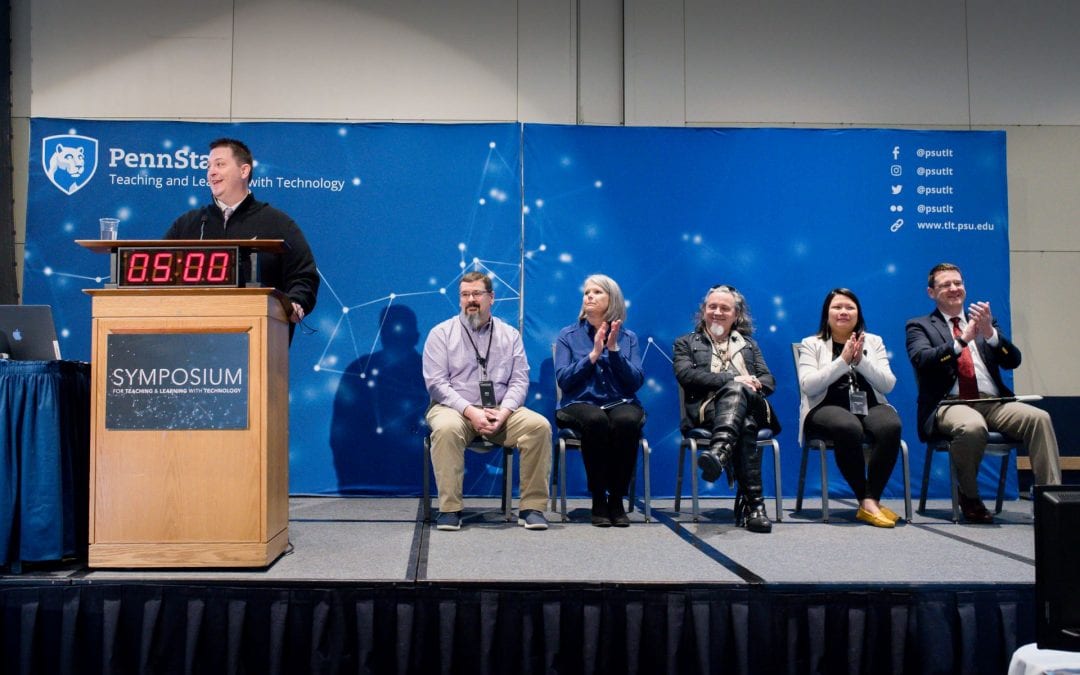
Mar 29, 2019 | Home Page
On Saturday, March 16, more than 500 attendees packed into Presidents Hall at The Penn Stater Hotel and Conference Center to kick off the 26th Symposium for Teaching and Learning with Technology at Penn State. One of the most innovative professional development events of the year at Penn State, no other conference promises to spark your imagination and stoke your curiosity for what is possible for the future of higher education.
In her opening remarks, Jennifer Sparrow, senior director of Teaching and Learning with Technology, touched on Penn State’s commitment to forward-thinking with initiatives such as President Barron’s vision for One Penn State 2025, a guiding framework for University-wide education innovation with a focus on student success and lifelong engagement. “I am proud that Penn State continues to be cutting-edge and Teaching and Learning with Technology collaborates with faculty to explore how innovative technology can transform education to advance student learning.”
Penn State leads the charge in reimagining student learning by tackling the burning discussions in higher education on topics such as immersive learning, connecting education to the workforce of the future, and promoting access and equity.
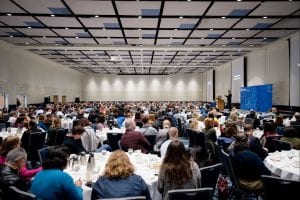
Keynote speaker Dan Heath addresses a crowd of more than 500 attendees at the 2019 TLT Symposium at The Penn Stater Hotel and Conference Center.
After the buffet breakfast, four-time New York Times bestselling author and a Senior Fellow at Duke University’s CASE Center, Dan Heath delivered the keynote address on how to make ideas stick. “Our memories are leaky, fallible, and they deteriorate,” says Heath. “For an idea to stick, it needs to be understood, remembered, and change something.”
Citing the research done by Dr. Michael Palmer, professor of chemistry and director of the Center for Teaching Excellence at the University of Virginia, Heath captivated the audience with his explanation of how Dr. Palmer used learner-centered, backward-integrated design principles to convince instructors to rethink how they create a syllabus to teach their courses. By starting with a goal of what is most important for students to take away from a course and working backward to create the activities and assessments, the core ideas have a chance of sticking long after students leave the classroom.
Heath co-authored four must-read business books, with his brother Chip, including Made to Stick, Switch, Decisive, and their latest, The Power of Moments.
Energized by the keynote speaker’s message, attendees dashed to the concurrent sessions—two before lunch and two afterwards. The most popular sessions covered topics including 3D printing, 360-degree videos, open educational resources, learning the art of storytelling, the future of digital fluency, and leveraging prototypes of artificial intelligence applications to support data empowered learning at Penn State.
The most anticipated aspect of the Symposium every year is the Open Innovation Challenge, where five faculty innovators have five minutes to present their idea in the hopes that it will ignite the attendees’ curiosity and earn their votes as the most impactful.
Professor of Astronomy Chris Palma envisioned technology that will help students embody solar system formations; Faith McDonald, professor of English, hoped to prepare students with digital stories to face workplace challenges; Dr. Matthew Woessner, professor of Political Science, wanted to create 360-degree videos to take students to distant places through virtual reality; Josephine Wee, assistant professor of food science, wanted students to reimagine classrooms without textbooks and embrace interactive content in real-time; and Rodney Allen Trice, professor of practice in the graphic design department of the Stuckeman School at Penn State, won the challenge with his idea “Walk a Mile,” a series of 360-degree videos and photos that create an immersive experience to invoke empathy. Penn State’s Stuckeman School also houses graduate and undergraduate degree programs in architecture and landscape architecture.
Over the course of the year, Trice’s idea will be explored and developed with the help of TLT staff. “Working on the Open Innovation Challenge is the highlight of my year,” explains Zach Lonsinger, learning experiences designer for Teaching and Learning with Technology. “I enjoy having the opportunity to meet and work with amazing faculty who have this contagious enthusiasm and passion for transforming teaching and learning with their big ideas.”
The conference ended with faculty networking over scoops of Penn State Berkey Creamery ice cream while trying out some new technologies such as test driving a BEAM robot and stepping into virtual reality with headsets at the Discovery sessions.
The Symposium for Teaching and Learning with Technology brings together faculty, staff, and innovators to inspire new ideas for what is possible in the future of higher education. It takes one “sticky” idea to inspire innovation that changes the world. From Gutenberg’s printing press to Thomas Edison’s light bulb, curiosity fuels learning, and educators are charged with stoking it.
“It’s incredible how dedicated our faculty, staff, and students are to show up at 7:30 a.m. on a Saturday morning to share the innovative things that they are doing in the classrooms and to learn more about what is happening in the teaching and learning community at Penn State,” says Sara Davis, 2019 Symposium chair and Teaching and Learning with Technology instructional designer. “I want to thank everyone who attended the 2019 Symposium and mark your calendars, the 2020 TLT Symposium will be on Saturday, March 21, 2020. I hope to see everyone next year.”
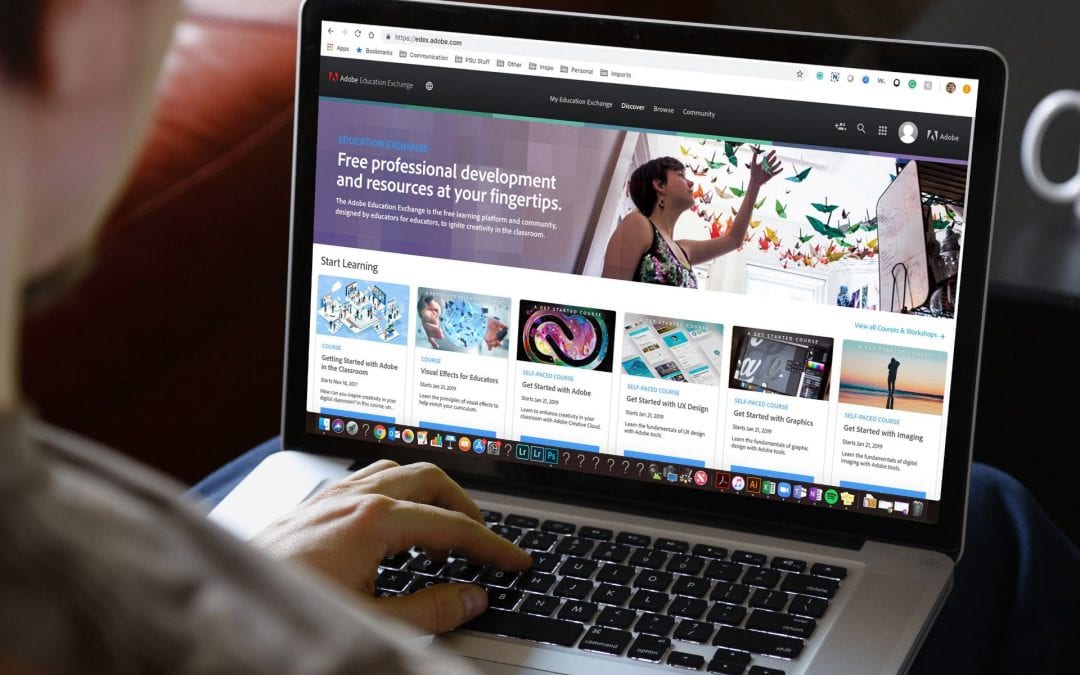
Jan 2, 2019 | Home Page
As part of its Strategic Plan, Penn State continually strives to drive digital innovation in higher education. The University’s partnership with Adobe provides students and faculty access to some of the most powerful digital services and resources available which makes innovation remarkably achievable.
Starting in January 2019, Penn State instructors will have access to dozens of free Adobe Collaborative Courses that are taught “by educators for educators.”
“Incorporating digital media into coursework is an excellent way to develop students’ skills that will prove beneficial in their professional lives,” said Kyle Bowen, director of innovation with Penn State’s Teaching and Learning with Technology. “These Collaborative Courses from Adobe cover a broad range of faculty needs, whether instructors are just starting with digital media or have years of experience.”
The courses are open for enrollment now with the earliest offerings beginning on January 21, 2019, and will cover products ranging from Photoshop to After Effects and many in between. The time commitment for each course will vary based on the skill level it is tailored to and the product it covers. Enrollees can expect to commit between two to 25 hours of instruction depending on their needs.
Upon successful completion of each course, successful “graduates” will receive an accredited professional development certificate from Adobe and a digital badge.
Interested Penn State faculty and staff members can visit Adobe’s Collaborative Courses hub for more details.
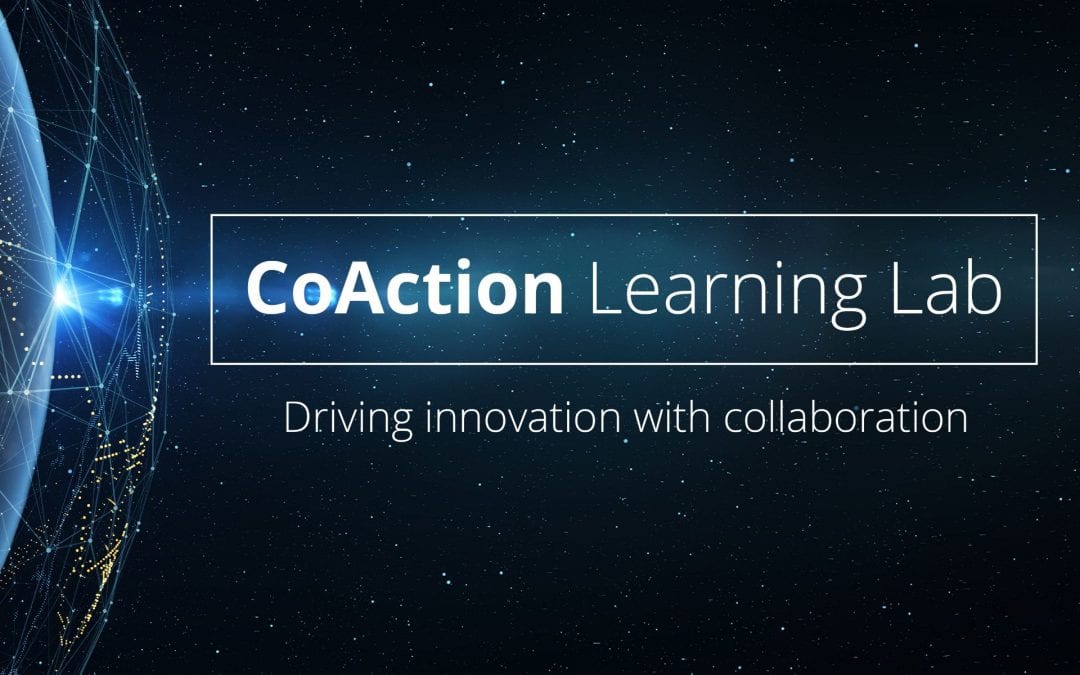
Nov 6, 2018 | Home Page, Uncategorized
A worldwide collection of universities and colleges have joined together to explore technology’s potential to define the prospects of teaching and learning. With its debut, this collaboratory called the CoAction Learning Lab will create an online library of original and curated resources that will support higher education innovators.
“Emerging technology has outstanding potential to advance the vision of equal access, high-quality learning experiences, and continuous innovation in higher education,” said Michael Kubit, Penn State chief information officer. “By continuously exchanging ideas, the CoAction Learning Lab community expects to establish and grow resources that support meaningful ways to leverage emerging technology to advance teaching and learning.”
Penn State launched a call for community partners in April 2018, and a diverse group of 18 universities and colleges across four continents signed on to participate. Currently, the group is establishing a shared set of core values that can drive decision-making around how technology can support teaching, learning, and pedagogy in higher education.
The following institutions have representation in the CoAction Learning Lab:
- Penn State – leader and founding member
- Arizona State University
- Charles Sturt University, u!magine Digital Learning Innovation Laboratory
- Conestoga College
- California State University Channel Islands, Teaching & Learning Innovations
- Curtin University Learning Futures
- Full Sail University Media Communications & Full Sail Labs
- Ithaca College
- State University of New York (SUNY) System Administration
- Taylor’s University
- University at Buffalo
- University of Central Florida
- University of Connecticut Digital Media & Design
- University of Missouri
- University of Ottawa
- University of Plymouth
- University of Tennessee Libraries
- University of West Florida
- Western Governors University
Each community partner is represented by a team consisting of at least one technology leader, one learning facilitator, and one student. By including each of these voices, diverse perspectives from across higher education will shape the foundation of the online library.
Additionally, the public will have opportunities to provide feedback as the CoAction Learning Lab identifies its values and compiles a list of technologies that enable and support those values.
Ultimately, the library’s resources will be freely accessible online for the worldwide higher education community. The resources will support students, instructors, instructional designers, and technology leaders on issues like creating student-centered learning experiences, advancing effective digital pedagogies, and more. These resources will be available on the CoAction Learning Lab’s website.





